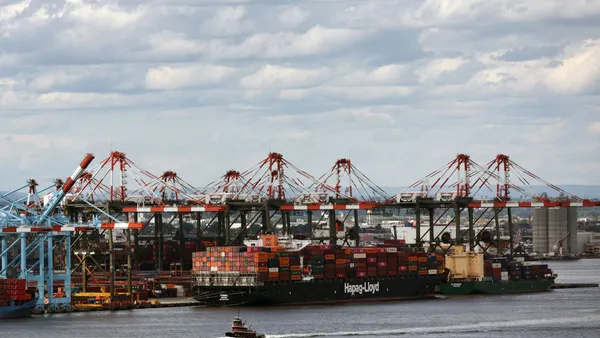Dive Brief:
- Only 16% of 100 port and harbor authorities surveyed said they had made "significant or practical" plans for Brexit with nine weeks left until the U.K. exits the European Union on March 29, according to a report from executive search firm Odgers Berndtson. More than 80% of respondents have done "little or no planning for Brexit."
- More than half the port leaders (59%) expect Brexit to have a negative or strongly negative impact on port operations, citing physical blockages and additional complexity as the top two pressing concerns.
- Most ports (80%) see physical infrastructure as the top priority for additional investment, while technology was the second highest priority (47%) to help ports adjust to a post-Brexit environment that could see significant congestion and disruptions at U.K. ports.
Dive Insight:
U.K. authorities will look to regional ports to relieve demand on busy ports in southern England, but those ports may be ill-prepared to fill that role.
"The ports industry is keen to seize on any opportunities arising from Brexit, but this is the first real indication of what’s actually happening outside ports like Dover," said Paul Butterworth, head of the Maritime & Shipping Practice at Odgers Berndtson, in a company press release.
Only 25% of U.K. port leaders reported they were in a position to handle Brexit well. A third believe further investment will be required for them to cope with the change, and 40% said they didn't know or doubted their port's ability to handle additional traffic volumes.
The Bank of England has warned a no-deal Brexit, one without negotiated trade agreements, would leave U.K. companies struggling with the demands of importing and exporting, according to the Financial Times.
The British Ports Association said its member ports and terminals are preparing for a variety of scenarios as the country deals with the evolving uncertainty of the Brexit negotiations. Assembling a senior team prepared to succeed after Brexit is also a priority, although 83% of the ports believe they have the right leadership at least for the short term.
Ferry ports are likely to be impacted the most from severing ties with their direct counterparts on the continent, World Maritime News reported. Seaborne Freight, the company contracted to provide ferry services, has said it would not be able to provide services until late April.













